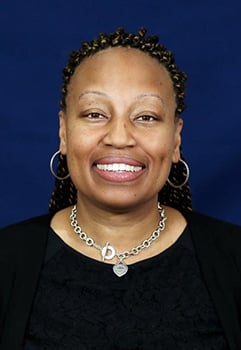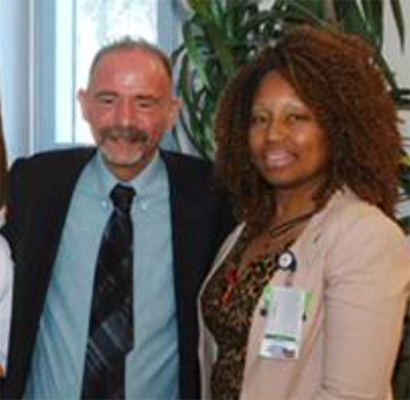Across the country, more than 30,000 soldiers fight an internal battle against the human immunodeficiency virus (HIV) that turns their cells into factories that seize other cells and weaken their immune systems. If the veterans aren’t treated quickly, it can lead to acquired immunodeficiency syndrome (AIDS), for which there is no cure. Even if veterans get medication in time, their immune systems still might become so weak they can’t fight off other infections and cancers that can kill them, according to the U.S. Department of Health and Human Services. That’s why a University of Colorado College of Nursing student plans to propose a new class for nurses to specifically address veterans with the disease.
“If providers are more informed, they will be better equipped to serve our veterans,” says Sheika Adams, MHA, BSN, CPPS, ACRN, CMSRN. “That means staying abreast of new treatments and medications and becoming culturally aware and sensitive about HIV/AIDS.”

CU Nursing student Sheika Adams, MHA, BSN, CPPS, ACRN, CMSRN |
Adams is earning a Doctor of Nursing Practice (DNP) degree online at CU Nursing with a concentration in Military and Veteran Health Care. This month, the leading national philanthropic funder of graduate nursing education Jonas Philanthropies awarded her a scholarship to complete her academic degree.
“I’m pleasantly surprised, grateful, and looking forward to this opportunity,” says Adams.
For her program project, Adams will propose creating new coursework for registered nurses (RN) and advanced practice registered nurses (APRN) within a training program already established at the Veterans Affairs Southern Nevada Health Care System. The proposed project still needs review and approval by the VA and College of Nursing.
Adams is a veteran of the United States Army Reserve and was deployed to Kosovo for Operation Enduring Freedom. But she didn’t learn about soldiers with HIV/AIDS during her military service. Instead, Adams began working with the population when she applied to be a research nurse at Johns Hopkins School of Medicine in Maryland in 2016. Her new job was to perform clinical trials with the population.
From there, she collaborated with other medical professionals to learn more about alternative treatments and new medications and became an HIV/AIDS Certified Registered Nurse, a Certified Medical Surgical RN, and a Certified Professional for Patient Safety.
Eventually, Adams moved to Las Vegas, NV where she works full time at the Veterans Health Administration as a registered nurse patient safety consultant, and part-time as a clinical nursing instructor at Nevada State College and the College of Southern Nevada. She serves as vice president of the local Association of Nurses in AIDS Care and is on the board of directors for the HIV/AIDS Nursing Certification Board. On top of all of those jobs, Adams just became a new mom to a baby boy.
Her military and medical experience merged in synchronicity in 2020 when Adams organized a two-day conference about HIV awareness that was attended by more than 100 people. The climax of the conference was a panel discussion with Timothy Ray Brown, known as “The Berlin Patient.” He was the first person cured of HIV. (Brown died last year from cancer.)
|
|
At the end of the conference, participants completed a survey to provide feedback. That’s when Adams learned many nurses believe more training is necessary to not only treat people with HIV, but specifically military veterans with the disease and for competencies to be veteran centric.
“That is what motivated me to focus my DNP project on the exploration of revising the current curriculum to include an HIV/AIDS component for new graduate RNs and APRNs entering the training program at the local Veterans Health Administration. The training will be comprehensive and based on the scope of the nursing practice,” says Adams.
Dr. Pearl Treyball, her advisor and the Specialty Director of Veteran and Military Health Care academic programs, says “What is most important in this work is the cultural sensitivity and understanding of the veteran and the impact this has on delivery of care. Veterans have endured and sacrificed so much through their service, and when faced with a catastrophic illness, understanding of the whole person and the veteran psyche makes a difference for compliance to treatment and complex case management.”
Adams says it may take years before the new coursework is added to the curriculum, as extensive review and approval of her DNP project is required. If approved, Adams hopes the new class will help create providers who are better equipped to care for veterans with HIV/AIDS.




